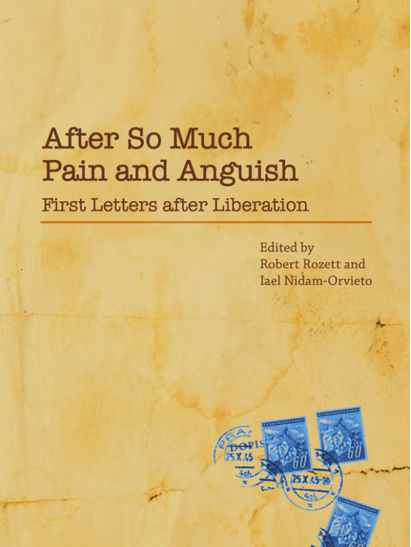Robert Rozett, Iael Nidam-Orvieto, Eds., After so much Pain and Anguish: First Letters after Liberation
Reviewed by Alex Grobman, Ph.D., resident scholar at the John C. Danforth Society and a member of the Council of Scholars for Peace in the Middle East (SPME)
When the Jews of Europe were liberated from the concentration and extermination camps, it not surprising that many of them were eager to try to contact relatives, friends, and acquaintances throughout the world. After So Much Pain and Anguish: First Letters after Liberation, (Jerusalem, Israel: Yad Vashem, 2016) 292 pages, a unique and fascinating anthology, edited by Drs. Robert Rozett and Iael Nidam-Orvieto, provide a singular opportunity to understand their unvarnished and raw post-war views before they were exposed to outside influences.
Written in every European language as well as in Hebrew and Yiddish, the missives enable readers to, in the words of the editors, “raise questions that official documents are unable to answer…while leaving many things unsaid.”
Unlike so many published memoirs and solicited testimonies, the heart-wrenching letters presented here were never edited.
Searching to Reconnect and for Help
Most were written in response to messages the authors received from family members and friends who were searching for survivors. In some cases, they were from other concentration camp prisoners from whom they had become separated and with whom they were eager to reconnect. Often these fellow survivors had become a second family to the authors of these letters.
Unfortunately, some of the survivors whose work is included in the anthology were so weak and frail after years of deprivation that they died shortly after writing their letters.
Those without families wrote to close friends or even acquaintances, often pleading for assistance. Some survivors wrote to Max and Jehudith Leshem, active Zionists in Lithuania before the war who made Aliyah prior to the outbreak of hostilities. For those desperate to reach Palestine, the Leshems became the couple to contact, especially by survivors who either knew them before the war or heard about them during and after the Holocaust.

Writers’ Goals
Among the survivors’ fiercest goals was to make sure people knew who they were and what they had experienced.
Their letters reflect the writers’ need to control their own destiny. Most were determined to rebuild their lives, which meant leaving the Displaced Persons (DP) camps and, if possible, reconnecting with whatever friends and family were still alive. Many letters expressed the writers’ determination to return to work.
These letters can be seen as the writers’ initial endeavors in the process to achieve these ambitions.
Editors’ Goals
For the editors, the goal of the anthology, which was published by Yad Vashem, was to place the letters in context, providing as much information as possible such that each writer may be viewed “as a full-fledged human being, an actor in the horrible drama that enveloped them, and not just an object of persecution.”
Thankfully, the editors of this extremely significant contribution to Holocaust studies are themselves, major scholars. Dr. Rozett is a senior historian at the International Institute for Holocaust Research at Yad Vashem as well as the former director of its libraries. Dr. Nidam-Orvieto is the director of the International Institute for Holocaust Research at Yad Vashem.
“If the Nazis sought to deprive them of their basic human dignity and their very lives, it is incumbent upon us to do our best to present them as fully as possible,” they wrote.





